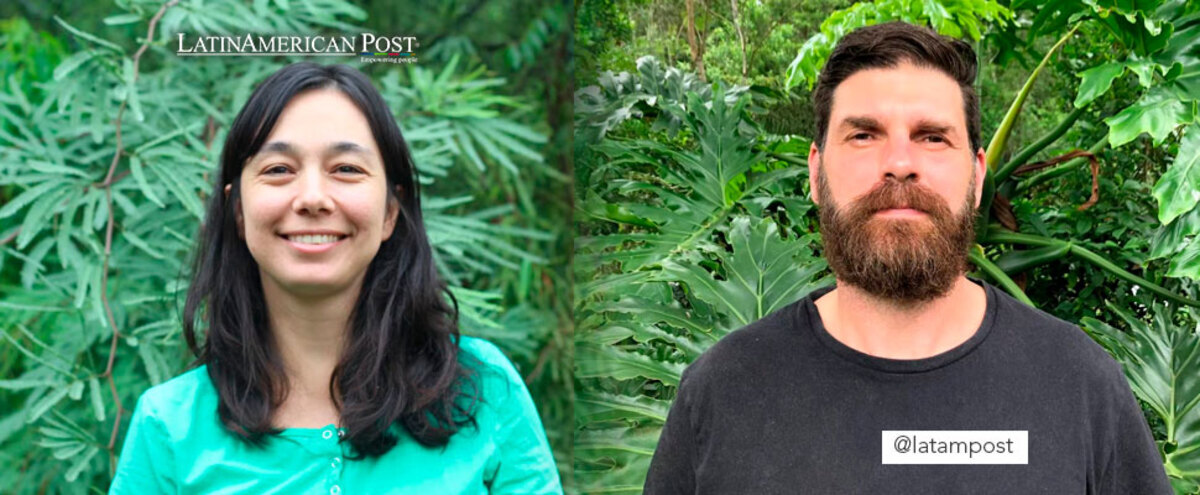Two Latin American Scientists Win The 2022 Whitley Awards
Micaela Camino and Pablo Hoffman receive awards for their projects that seek to preserve forests in Argentina and Brazil.

Photos: whitleyaward.org
LatinAmerican Post | Brandon Martínez Salazar
Listen to this article
Leer en español: Dos científicos Latinoamericanos ganan los Premios Whitley 2022
The environment and climate change are perhaps the most important issues to be addressed in the coming years. Clearly, all this must be managed with State policies that guarantee the preservation and care of all ecosystems as an essential fact for the survival of human beings and animals. However, society (from industry to communities) has a responsibility to participate and contribute positively to the mitigation and prevention of climate change.
How to do it? Reducing single-use plastics, protecting forests, reducing gas emissions, replacing traditional energies with clean energies, among others. An example of these recent contributions is made by two Latinos, who are an efficient example of leadership. We are talking about Micaela Camino and Pablo Hoffman, two Latin American scientists who have been winners of the prestigious 2022 Whitley Awards, whose projects are considered pioneering solutions to the biodiversity crisis.
What are the Whitley Awards?
This award gala is also known as the Green Oscars. These are the most prestigious international awards for environmental conservation. Each year, through the Whitley Fund for Nature, the best proposals and environmental leaders are selected. As such, they are in charge of recognizing the best contributions to the preservation of wildlife in regions such as Asia, Africa and Latin America.
Who are the two Latin Americans who were awarded this year? What are their projects about?
Micaela Camino is an Argentine biologist. Throughout his professional career he has been interested in the South American Chaco, known for being the second largest ecosystem in Latin America, after the Amazon. To be more specific, the South American Chaco is a subtropical dry forest that has an area of approximately one million square kilometers and is shared between three countries: Argentina, Bolivia and Paraguay.
Now, in this great ecosystem lives a species of mountain pig known as the chimilero pig, an animal that only lives in the South American Chaco and due to high deforestation this species is threatened.
Therefore, this Argentine biologist has been fighting to stop the deforestation that today affects this region of the world. Camino, in its proposal to protect species and the dry forest, has promoted strategies such as workshops guided by lawyers and environmental organizations that allow communities to be taught the laws that protect the forests that surround them.
For his part, forestry engineer Pablo Hoffman from Brazil has focused his professional life on protecting and conserving the araucaria forest in his country. According to Hoffman's research in his application for the Whitley Prize, this ecosystem covered about 40% of the state of Paraná. However, today that number has been reduced to less than 1% of ecosystems that are in good condition.
Also read:Latin America in Short: Southern Hemisphere Meteor Shower | Luis Díaz in the Champions League Final
In the work that he has been carrying out together with his colleagues, they have identified that one of the tree species most affected by environmental deterioration is the Araucaria. Hoffman explains that the reasons that have led to the destruction of these places have been the economic cycles in southern Brazil. In other words, these territories have been overexploited by livestock, agriculture and logging, which has brought disastrous consequences for nature.
Their proposal to mitigate the impact and to be able to save the forests consists of the production of seedlings of endangered species that are genetically diverse and that would be replanted in the region. The objective of his plan is to supply 60,000 seedlings to 20 specific sites to reforest them. In this way, it seeks to engage partner NGOs, nurseries, farmers and landowners to rebuild forests, support wildlife and reduce carbon.
What do these initiatives seek?
The Whitley Awards are very ambitious because they help with funding to improve biodiversity. Therefore, what is happening around these two cases in Latin America is clearly an important advance, not only in terms of research but also in the intention of involving communities to conserve all species in danger of extinction.
It is important to note that the main cause of the challenges facing the world in environmental matters is the intervention of man for economic purposes in nature reserves. For this reason, society has to be attentive to the legislation and not allow the forests to continue to be damaged, which are ultimately an essential part of life on the planet.





